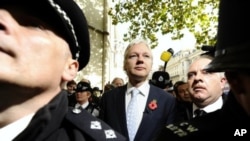A British court has ruled that the founder of Wikileaks, Julian Assange, should be extradited to Sweden to face accusations of sexual assault and rape. The ruling comes as his whistleblowing organization - which published thousands of stolen, confidential cables from U.S. embassies - struggles to raise funds.
London’s High Court rejected Julian Assange’s appeal against his extradition to Sweden Wednesday morning.
The Wikileaks founder emerged from the hearing still adamant that the legal process is flawed.
"I have not been charged with any crime in any country," said Assange. "Despite this, the European arrest warrant is so restrictive that it prevents UK courts from considering the facts of a case as judges have made clear here today. We will be considering our next step in the days ahead.”
Prosecutors in Sweden want to question Assange about allegations of rape and sexual assault against two women - charges he denies.
His lawyers have been fighting the extradition request since his arrest a year ago.
Many Wikileaks supporters claim the extradition request is politically motivated by governments angered at the organization’s activities.
In November last year, Wikileaks published thousands of stolen, confidential U.S. diplomatic cables. They included sensitive information on anti-terrorism activities and candid views on foreign leaders.
Previous leaks included tens of thousands of confidential files on the wars in Afghanistan and Iraq.
Assange has claimed he risks being handed over to the United States for prosecution, if sent to Sweden.
Charlie Beckett, media expert at the London School of Economics has just written a book on Wikileaks.
“I don’t think you have to be paranoid to think that they are actually trying to ‘get’ Wikileaks," said Beckett. "But I’m not sure that this legal process has got anything to do with that. There’s enough pressure coming from the American government, from governments around the world frankly, in alliance with corporations who are putting the heat upon Wikileaks, they’re making it much harder for Wikileaks to operate.”
The latest setback for Julian Assange comes as Wikileaks struggles for funding.
Government pressure saw companies like Visa, Mastercard and Paypal stop processing donations to the organization. Analysts say 95 percent of its funding has dried up.
That does not mean the end of new types of media like Wikileaks, says author Charlie Beckett.
“We still have millions of people out there who are very skeptical about mainstream media and mainstream politics," said the author. "We’ve got a networked information age where it’s much more vulnerable to large-scale disclosure of secrets. And so even if Wikileaks disappears, leaking and this kind of radical website activity, that will certainly not disappear.”
Julian Assange based Wikileaks in Sweden because he believed its laws on freedom of speech would shield it from prosecution.
Now he has two weeks to appeal to Britain’s Supreme Court or he will be extradited to Sweden to face the charges of rape and sexual assault.










